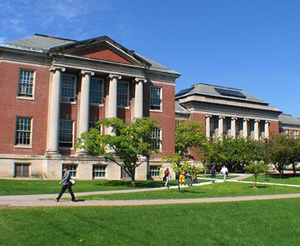
04/19/2012
SUNY Cortland was praised Wednesday by a review team from the Middle States Commission on Higher Education that found the College met all criteria for reaccreditation and offered few recommendations for improvement.
In an oral report delivered to members of the College community, Angelo Armenti, chair of the visiting team, lauded SUNY Cortland for clearly identifying and successfully pursuing four strategic priorities: academic excellence, transformational education, well-being and the maximization of resources.
“Cortland has shown great progress,” Armenti told a gathering in Brockway Hall’s Jacobus Lounge. “At this point in time, Cortland staff and faculty are certainly entitled to a brief period of celebration. The team believes Cortland has a bright future ahead of it.”
Armenti’s nine-member team evaluated the College’s adherence to 14 educational and institutional quality standards during a four-day campus visit. The team will now turn the findings summarized in Armenti’s oral report into a formal recommendation to the Middle States Commission for Higher Education. The Commission will make the final decision on renewing SUNY Cortland’s accreditation, probably early this fall.
“We are incredibly pleased that the Middle States team confirmed what we already knew to be true: SUNY Cortland is an extraordinary place of learning that adheres to the highest professional standards,” College President Erik Bitterbaum said.
President Bitterbaum praised Virginia Levine, executive assistant to the president, and Lynn Anderson, professor of recreation, parks and leisure studies, for their work as co-chairs of the 28-member College committee that drafted SUNY Cortland’s Middle States self-study report, the foundation on which the visiting team built its review.
Levine, Anderson and the committee began working on the project about two and a half years ago. Instead of following the standard format, they organized the report around the College’s institutional priorities to highlight how the College’s vision is reflected in everything it does. When completed, the study — done once every 10 years — consisted of three volumes with Internet links to more than 500 documents.
The review team praised many of the College’s initiatives, such as community outreach through its Institute for Civic Engagement, new programs for assisting rising numbers of transfer students, opportunities for transformative educational experiences, and measures taken to cope with state budget cuts while maintaining quality programs.
It made several suggestions and only two recommendations for improvement. Those recommendations - that the College’s financial planning be more closely linked to its strategic plans and that measurable goals and objectives be developed for more programs and individual courses - are sensible extensions of the direction the College planned to go anyway, Levine said.
“There were no surprises whatsoever,” Levine said. “These are things we knew we had to do, and we appreciate their input. Overall, it was an extremely positive report.”
Accreditation is an important indication of a college’s quality and has an impact on student financial aid, transfer credits, the value of an institution’s degree and other areas. The Middle States commission is responsible for accrediting colleges in New York, New Jersey, Pennsylvania, Maryland, Delaware, the District of Columbia, Puerto Rico and the Virgin Islands.